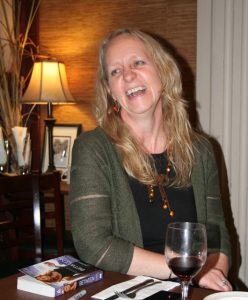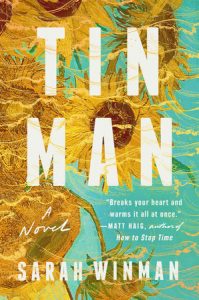 Ellis and Michael begin a lifelong friendship after Michael’s mother dies and he comes to live with his grandmother Mabel, both boys sharing the affection of Mabel and Ellis’ mother Dora. The delicacy of their first love romance shatters as Ellis yields to society’s mores after a turning point in France, and even Michael understands that Annie is “the one.” Loving Annie draws Michael into their orbit, expanding her idea of family to include him and his grandmother. Although readers are familiar with the horrific stories of gay men succumbing to AIDS, Winman carefully portrays Michael’s unique perspective on his friends’ deaths—he returns to France where he grieves for all that he’s lost in his life. The first half of the book focuses on Ellis after all of his losses leave him off-kilter, wondering what to do with himself. The second half flashes back through Michael’s journals, a candid look at a man whose fulfilled expectations disappoint. This is a gorgeous story of how love grows to include those who might be estranged by circumstances. I was fortunate to receive a copy through a Goodreads giveaway.
Ellis and Michael begin a lifelong friendship after Michael’s mother dies and he comes to live with his grandmother Mabel, both boys sharing the affection of Mabel and Ellis’ mother Dora. The delicacy of their first love romance shatters as Ellis yields to society’s mores after a turning point in France, and even Michael understands that Annie is “the one.” Loving Annie draws Michael into their orbit, expanding her idea of family to include him and his grandmother. Although readers are familiar with the horrific stories of gay men succumbing to AIDS, Winman carefully portrays Michael’s unique perspective on his friends’ deaths—he returns to France where he grieves for all that he’s lost in his life. The first half of the book focuses on Ellis after all of his losses leave him off-kilter, wondering what to do with himself. The second half flashes back through Michael’s journals, a candid look at a man whose fulfilled expectations disappoint. This is a gorgeous story of how love grows to include those who might be estranged by circumstances. I was fortunate to receive a copy through a Goodreads giveaway.
The Italian Party by Christina Lynch
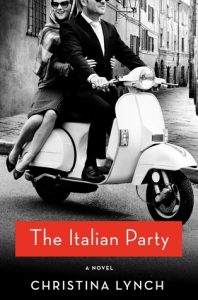 Scottie married Michael and they moved to Siena, Italy, both bringing secrets and gathering more, so that they appear to be a happily married couple, he selling American tractors to Italians and she his adoring housewife. Showing Italians the American Dream fulfills a larger agenda for Michael, while Scottie tries to look behind the curtain and see his true self. She seems to have a lot more freedom than expected for a woman in the mid-50s, and Italian men are portrayed as oversexed political creatures. Homosexuality is handled in a sensitive, if somewhat stereotypical, manner considering the times—adultery is inexplicably given more tolerance. When the couple open up and confess all, they become a team, and Michael learns that political secrets are larger than his own agenda, gobsmacked by his own company. This is a great historical fiction, with Siennese culture, the fallout from being overshadowed by Florence, and the political turmoil of Communism versus pro-Western leaders vividly portrayed. It shows the complexities of the world players’ motives and relationships, and how this plays out in the individual lives of the Italian people.
Scottie married Michael and they moved to Siena, Italy, both bringing secrets and gathering more, so that they appear to be a happily married couple, he selling American tractors to Italians and she his adoring housewife. Showing Italians the American Dream fulfills a larger agenda for Michael, while Scottie tries to look behind the curtain and see his true self. She seems to have a lot more freedom than expected for a woman in the mid-50s, and Italian men are portrayed as oversexed political creatures. Homosexuality is handled in a sensitive, if somewhat stereotypical, manner considering the times—adultery is inexplicably given more tolerance. When the couple open up and confess all, they become a team, and Michael learns that political secrets are larger than his own agenda, gobsmacked by his own company. This is a great historical fiction, with Siennese culture, the fallout from being overshadowed by Florence, and the political turmoil of Communism versus pro-Western leaders vividly portrayed. It shows the complexities of the world players’ motives and relationships, and how this plays out in the individual lives of the Italian people.
I was fortunate to receive a digital copy of this wonderful book from the publisher through NetGalley.
Prompt: “The trees have bloomed again sweetheart, and you’re still not here” (with photo)
 Writing Bad Facebook writing group
Writing Bad Facebook writing group
Cherry blossoms fall outside through the hazy sunlight, causing Henri’s heart to jump at the possibility. But no, it isn’t her, only halos and silhouettes from the angle of the light through the window.
Having heard of Houdini’s pact with his wife for whichever one died first to come back and report of the afterlife, Mina researched spiritualism, witchcraft, religions, anything and everything to learn how to return, even practicing astral projection. Phone calls to family and friends confirmed her recall of astral visitation, shaking Henri’s paradigm with her accuracy. Her seemingly lifeless body inert on their bed, safely guarded by him, perturbed him more. Periods of separation lengthened, panic rising in his throat like bile, perils of astral projection haunting him in the interim. The last time, he waited hours and she didn’t return. By the next day, her body lay deathly still, while he sat staring in his sleep-deprived terror. Days. Weeks. Months. She looked perfect, requiring nothing, inexplicably preserved, so that he maintained his hope that she had not actually died.
Now the cherry blossoms again taunt him with their shadows in his growing belief that he will witness somehow the return of her essence to her physical self, three years on.
Brandi Reeds—Writer, Philosopher, Collector of Tap Shoes

I met Brandi Reeds through the Lake Union Authors Facebook page. She also writes YA under her pen name Sasha Dawn. As you’ll see, she’s truly dedicated to her writing. I’m fortunate that she agreed to allow a peek into her writing life on my little blog. Her adult debut novel “Trespassing” just came out in April.
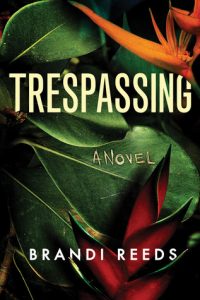
Describe your writing process, including schedule, environment, and inspirations.
SCHEDULE: Writing isn’t my only career. I have another full-time job, two busy teenagers, three dogs, and an incredibly busy husband, so I have to use every second wisely. I write whenever I have a free moment. A typical day:
● I wake up around 2 or 3 a.m., thinking of something that won’t quit. I’ve been an insomniac most of my life.
● Often, my laptop is open and on my lap, and my fingers are tapping keys before I open my eyes.
● I’ll write in bed for a couple of hours, close the laptop, and catch a quick nap before my day begins. My alarm goes off at 6. My goal is to have 1,500 words written before this moment. I usually meet my goal.
● After my girls are at school, I go for a run if my schedule permits, then work begins. I balance my home design and renovation business with writing. Both are on-demand and involve irregular hours. I have a design office in my home, and my laptop is my mobile writing office. Sometimes I write a sentence here, a sentence there; other times, I carve out blocks of time in a slower design day to write.
● Evenings are for family: dinner, walking puppies, jogging (if I missed my earlier run), and time with my girls—helping with homework (though they rarely need it anymore, they still humor me) and getting them to the dance studio or to the theater, or voice lessons, or wherever else they need to be.
● By the time everyone’s evening activities are over, it’s usually about 10 and time for bed.
● I sleep for a few hours, and repeat.
PROCESS: I outline a book on a high-level basis before I begin to write. The outline isn’t carved in stone; I often find that the book shifts a bit in drafting. But this helps to keep me on track. I don’t always write in order. I find that writing what I’m feeling helps keep me productive. There’s no reason to stall simply because I don’t feel like writing a particularly challenging scene. I’ll come back to it when I feel better about it. Some days, I write only dialogue. Others, I write only setting. I can’t afford not to stay on schedule, as I have deadlines looming.
At present, I have 6 weeks to write a Brandi Reeds book, contracted less than a month ago, a Sasha Dawn novel due in early November, and Brandi’s third release due by July of next year…as well as edits due on other works already in progress I revise as I go, and once I finish the book, I revise twice more before sending it to my agent and editor for commentary.
ENVIRONMENT: I prefer to write in places without distraction, but my schedule doesn’t permit me to be too particular. I’ve written in the car while my husband is driving, in parking lots waiting for my girls, in hospital waiting rooms, in cafes, on trains. I will write anywhere, but I’m most productive between the hours of 2 and 5 a.m., when the world is still asleep.
INSPIRATION: Much of my inspiration comes from dreams (I often dream plots), from places I’ve been, struggles I’ve endured, and my wonderful family. I recently returned from Spain, for example, and I’d love to create a story set on the island of Majorca. That said, I’m a firm believer that writers are not born of safe keeping. I’m a survivor of many battles, and I think that helps me when it comes to creating worlds in which my characters live. My mind goes to crazy places due to what I’ve been through.
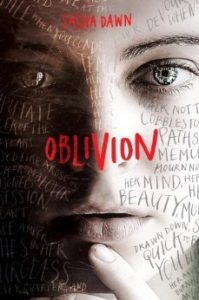 Tell me about your support system: beta readers, publishing team, and any other cheerleaders.
Tell me about your support system: beta readers, publishing team, and any other cheerleaders.
My daughters and my best friend and her daughters read much of what I write before I send it to my agents and publishers. They’re my system for reality-checks and often tell me when something doesn’t ring true (i.e., a teenager wouldn’t use this word here; or wouldn’t she be thinking about her kid at this moment?). I also have a great friend in writer Patrick W. Picciarelli, retired NYPD, who is often my sounding board when it comes to plotting, criminal activity, and the business end of publishing.
My agent, Andrea Somberg of Harvey Klinger Agency is incredible. She often offers suggestions and advisement for books before we send them to my editors. I’ve been blessed to work with some incredible editors and publishing teams. I think every editor I’ve ever worked with will tell you that I’m open to criticism. I’ve never been hung up on a book being solely mine; it’s a team effort, and editors offer brilliant advice.
My mother, siblings, aunts, cousins, friends, and grandmother are cheerleaders AFTER they’ve read my books, which is equally as important. My husband, Joshua, does not read. He says that if he wants to know what happens in my books, he’ll just ask me. This doesn’t offend or bother me in any way, as he’s still an integral part of the process. I discuss plots with him, and I often tell him at the end of the day what my characters managed to accomplish. He and my girls are constant supporters and I am endlessly grateful for them.
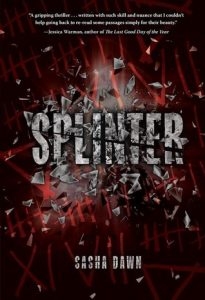 Take me through your publishing process, from final draft to published product.
Take me through your publishing process, from final draft to published product.
After we submit a final draft to my editors, the waiting begins. Some weeks later, I receive an email full of praise for what I’ve accomplished and created…and an attached edit letter detailing everything wrong with what I’ve done. My most intense experience with the edit letter entailed about 14 single-spaced pages. (Me at this point: “Ummm….you said you liked the book, right?”) So, after I cry for a few hours (kidding, I’ve never actually cried), I get back on the horse and revise.
Usually a book will go through 2 or 3 rounds of developmental edits. During this process, I’m filling out forms and giving input on cover design, depending on the publisher. Next, we go through a couple of rounds of copy-edits, and then a final polishing for interior design. Around this time, I receive final cover design and copy. And then suddenly, the book is real, tangible, and exciting. Sometimes, as an additional step, a publisher will ask me to check the ARC for errors.
How does your life influence writing and vice versa?
When I’m writing for the teen audience, I draw on my tumultuous teen years for emotional content. There is a little bit of me in every character I write, but I’ve never told my life story through a character. I’ve been writing for as long as I can remember, and for as long as I’ve been writing, it has kept me sane and balanced. As a teenager, I wrote as a sort of therapy. Other kids my age weren’t going through the things I was experiencing—or maybe they were, but back then, we sure didn’t talk about it—and I felt less alone because my characters went through much of what I did.
Now that I’m older, I like to think my writing reaches audiences who need it…and letters from readers support this thought. It means something to tell unconventional stories, because life is not normal. It means something to write people as they truly are, even if they’re often flawed and unlikeable. While some readers hate this about my work, there are more who write and thank me for telling a story through an authentic narrator. I don’t write fairy tales because life is dark and messy, and no person I’ve ever met is all good or all bad. Flaws are what make us interesting and varied, and so these are the stories I tell.
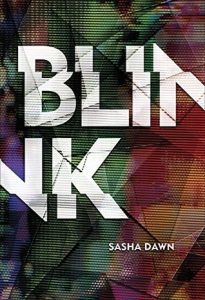
What do you love most about your creativity?
I’ve never considered facets of my creativity as something to love, and even thinking about this question now, I don’t know that I can answer it. Both my careers (writing and designing) require heightened levels of self-awareness, however, and through that awareness, I’m able to dissect struggles, learn from them, and project them onto a bigger canvas. Being a published author certainly puts me in a position to reach others, and I definitely appreciate all that accompanies the connections.
Ergo, due to my creativity, I’m able to extend my reach. For example, last spring, I visited my alma mater (Antioch Community High School in Antioch, Illinois) for writers week. I do this sort of thing whenever I have an opportunity, and I’ve visited high schools all over my home state. I tell my story to captive audiences, who are experiencing the same types of challenges I’d endured as a teen. While I’m sure a few high school students in every crowd are bored with me, or even asleep, the majority walk away from my presentation inspired to overcome whatever it is they’re dealing with. And I LOVE this part of my job.
It’s also pretty fun to name characters after people I know. Emily and Andrea in TRESPASSING are named for my nieces; Samantha in SPLINTER is named for my eldest daughter, and all the male characters in SPLINTER are named after my nephews; the main character in BLINK is named for Joshua, and his sisters are named for my best friend’s daughters, Margaret and Caroline; and my upcoming teen release (currently known as PANIC) stars a spunky introvert named Madelaine, for my youngest daughter. I tell people that if they don’t want to find traces of themselves on the pages of my books, they shouldn’t stop by for a chat. I can’t help it. It’s an occupational hazard. 🙂
Brandi Reeds also has a story on the HOOKED app, entitled OFF LIMITS:
http://www.amazingchatstories.com/se/offlimits-1
Brandi Reeds website (under construction—please be patient)
The Radical Element: 12 Stories of Daredevils, Debutantes, and Other Dauntless Girls edited by Jessica Spotswood
 The diversity in these stories is impressive, from girls facing internal and external religious challenges, to girls pretending to be something they’re not to make their way in a man’s world. These are tales of young women refusing to be a product of their time, yearning to be free of society’s mores. The authors refrain from a black and white picture, with a young Mormon girl questioning her religion, yet continuing to fight her community’s detractors. Secrets abound, as an orphaned girl lives life as a boy to take care of herself, and a young boy trades his secret of being a transgender with a Hispanic girl putting in tremendous effort to pass as white for Hollywood. One story had magical elements that didn’t seem to contribute to the plot, but as a whole, this book offers up a dozen girls as unintentional heroines who fought against patriarchy, misogyny, and other obstacles they intended to overcome.
The diversity in these stories is impressive, from girls facing internal and external religious challenges, to girls pretending to be something they’re not to make their way in a man’s world. These are tales of young women refusing to be a product of their time, yearning to be free of society’s mores. The authors refrain from a black and white picture, with a young Mormon girl questioning her religion, yet continuing to fight her community’s detractors. Secrets abound, as an orphaned girl lives life as a boy to take care of herself, and a young boy trades his secret of being a transgender with a Hispanic girl putting in tremendous effort to pass as white for Hollywood. One story had magical elements that didn’t seem to contribute to the plot, but as a whole, this book offers up a dozen girls as unintentional heroines who fought against patriarchy, misogyny, and other obstacles they intended to overcome.
I was fortunate to receive a digital copy of this wonderful book through NetGalley.
A Fist Around the Heart by Heather Chisvin
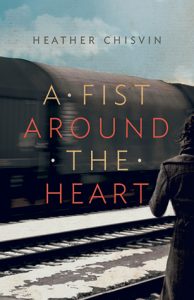 Anna “Bencke” Grieve’s life changed after Tsar Alexander II’s assassination. In fear for their lives as Jews, her mother, a privileged servant, asked her employers Count and Countess Chernovski to take Bencke and her older sister Esther with them to Canada. The Chernovski’s later adopt them, believing their parents to be dead. Bencke does her best to care for Esther, who suffers episodes from traumatic memories that incapacitate her at times, as she herself tries to fit her eccentric personality into Countess Chernovski’s picture perfect household. Decades later, Anna receives a phone call from the Winnipeg police informing her that her sister has committed suicide by stepping in front of a train. She heads to Canada seeking the truth. The story alternates between this investigation and a backstory of a life fully lived, from Anna’s forced relocation to NYC, to circumstances causing her to be deported to Russia during WWI. In the investigation, Anna learns her sister’s secrets and must live with them now.
Anna “Bencke” Grieve’s life changed after Tsar Alexander II’s assassination. In fear for their lives as Jews, her mother, a privileged servant, asked her employers Count and Countess Chernovski to take Bencke and her older sister Esther with them to Canada. The Chernovski’s later adopt them, believing their parents to be dead. Bencke does her best to care for Esther, who suffers episodes from traumatic memories that incapacitate her at times, as she herself tries to fit her eccentric personality into Countess Chernovski’s picture perfect household. Decades later, Anna receives a phone call from the Winnipeg police informing her that her sister has committed suicide by stepping in front of a train. She heads to Canada seeking the truth. The story alternates between this investigation and a backstory of a life fully lived, from Anna’s forced relocation to NYC, to circumstances causing her to be deported to Russia during WWI. In the investigation, Anna learns her sister’s secrets and must live with them now.
Chisvin brings history to life in Anna’s story, as dear reader sees her torn from her family as a child after her country’s leader is killed and Jews are blamed, and as an activist for women’s rights alongside Margaret Sanger. She becomes a part of the melting pot that is NYC, falls into the fear of Americans who deport her in the war, and witnesses the disorder of Russia as essentially an outsider. Chisvin brings closure to Anna in her mixed emotions of finally being free of her sister as it breaks her heart. The last line of the book is brilliant in its imagery of this closure.
I was fortunate to receive a digital copy of this beautiful story from the publisher through NetGalley.
Kerry Schafer / Kerry Anne King—Author and Creativity Coach
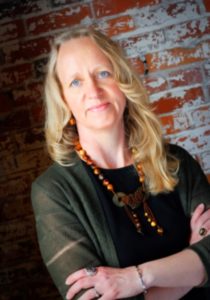 I
I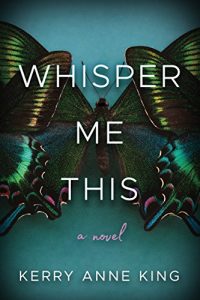 follow Lake Union Authors on Facebook, where I met Kerry Schafer, who also publishes under the pen name of Kerry Anne King. She graciously agreed to share her writing life with us. I’ve read and reviewed her upcoming release “Whisper Me This.” It’s fantastic! I highly recommend this novel and this author. Pre-order on Amazon.
follow Lake Union Authors on Facebook, where I met Kerry Schafer, who also publishes under the pen name of Kerry Anne King. She graciously agreed to share her writing life with us. I’ve read and reviewed her upcoming release “Whisper Me This.” It’s fantastic! I highly recommend this novel and this author. Pre-order on Amazon.
Elaborate upon your writing process—schedule, including how you mesh that time with family life, and how you measure progress, and your writing environment—whether you have a home office or work at another location, and what inspirations surround you that keep you writing.
I write at 4-of-dark in the morning most weekdays. Literally. I drag my poor, protesting carcass out of bed at 4 am, make coffee, and trudge up the stairs to my writing loft. This is the best way I’ve figured out to make sure I actually get my writing done, because if I wait until after work, I’m generally too tired and grumpy to be effective at writing. I also often write with a buddy—that way I have a scheduled time to show up and somebody to be accountable to. I also have an office away from home for my creativity coaching business, and I write there too sometimes, on weekends or evenings when I need a space away from the house to think and concentrate.
When I’m drafting, it works for me to set word count goals. That way, even when the writing isn’t going well, or I’m in one of those inevitable phases where it seems like the whole book sucks, I still feel like I’m making progress.
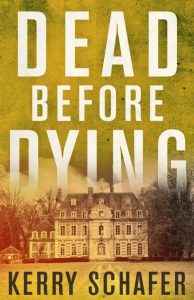
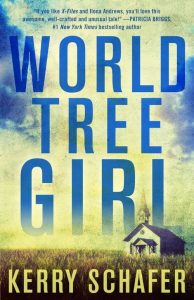
Shadow Valley Manor series
Explain why you use a pseudonym and the benefits of doing so…..also how you keep track of both authorships!
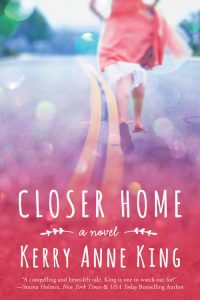
I use a pseudonym because Lake Union, the publisher for my women’s fiction titles, insisted that I have one. I resisted, in all honesty, but they were probably right to ask this of me. My two brands are very different and that can be off-putting to readers. A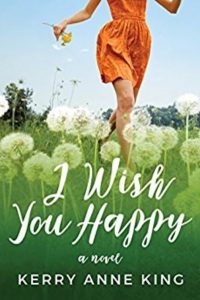 s Kerry Schafer I write fantasy and paranormal thrillers. As Kerry Anne King I write contemporary family dramas (although the book I’m writing now does have a touch of magical realism that makes my fantasy-loving-heart happy). Keeping track is fairly straight forward—Kerry leans to the dark side; Kerry Anne leans toward relationships and emotions.
s Kerry Schafer I write fantasy and paranormal thrillers. As Kerry Anne King I write contemporary family dramas (although the book I’m writing now does have a touch of magical realism that makes my fantasy-loving-heart happy). Keeping track is fairly straight forward—Kerry leans to the dark side; Kerry Anne leans toward relationships and emotions.
Describe your support system: beta readers, publishing team, Lake Union author collective, and any other cheerleaders.
I have an awesome group of support people, starting at home with my Viking. He is my biggest supporter and my first reader. After I’ve completed a draft and made a few revisions, he reads for continuity—he is forever shaking his head about my timelines, omissions, and the way my characters mishandle guns. I have several close writer friends who then read and critique for me.
The Between series
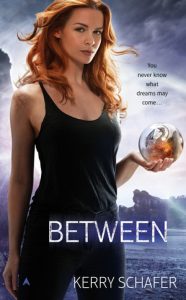
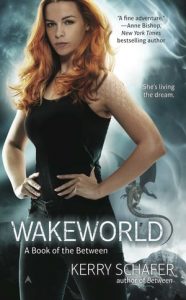

Walk me through the publishing process, from finishing the story to final product, as in who does what and how long it takes.
This process has been different at every publishing house I’ve been with. I love how it all works out at Lake Union. After my book is accepted and a contract is signed, I have a delivery date. On or before that date (I always aim for before—my motto is to under-promise and over-deliver whenever possible), I turn the manuscript in to my awesome editor. She gives it a read, usually within a week or two, and sends it back with some suggestions. Once those changes are implemented, the manuscript goes to my developmental editor. She reads and sends back revision notes. Typically I’ll have about three weeks for revisions. Then she reads again. There can be several rounds of this back and forth process during developmental edits.
Once the book is accepted by the developmental editor, the book goes to the copy editor. Within about a month it comes back to me and I have a couple of weeks to work through the copy editing process. From there it goes to production, and shortly thereafter I’ll get proof pages to review.
Somewhere in there other things happen. At Lake Union I get to review and give an opinion about cover concepts (this was not the case with other publishers). I also get to review and make revisions to back cover copy.
And then the magical elves turn the whole thing into a book and it gets published and people get to read it. Yay!!
The Dream Wars series
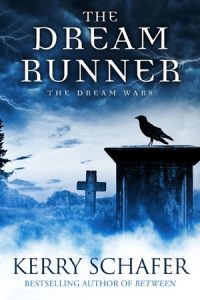

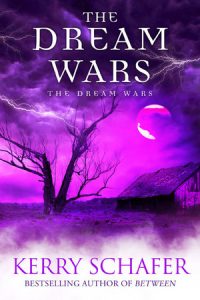
What do you love most about your creativity?
There is so much that I love—there really isn’t a “most.” I love ideas and the way they pop into my head randomly while I’m in the shower or mowing the lawn or driving to work. I love creating characters. I love putting words together in ways that sound like music to me. I guess what I love the very most are the unexpected surprises that happen in a book—the times where I think I know what I’m doing and what is going to happen, and then a character asks, “What about this?” and there’s a plot twist I never saw coming.
But there were far too many years of my life where I didn’t value my creativity or give it priority space. It used to come “after”—after work, after kids, after making my husband happy, after doing this, that, and everything in between, which meant that I didn’t do consistent writing. It also meant I was depressed, unfulfilled, and bitchy a lot. Recently, I’ve become a creativity coach on a mission to help other creatives get out of that trap. My business is called Swimming North: Where Creative Wellness Meets the Myers-Briggs. In short speak—”swimming north” is a metaphor for striking out in your own direction and going your own way. (There are penguins involved and you can read about it here) I believe that creativity is part of wellness, just as essential as mind, body, and spirit.
I’m a certified Kaizen-Muse coach, which means my coaching philosophy embraces the non-linear nature of the creative process, while using tools that are personally empowering, are not guilt inducing, and help clients learn to navigate the various things that get in the way of creativity (procrastination, harsh self talk, fear, doubt, and resistance are some of the usual suspects). I’m also a certified Myers-Briggs practitioner, and I find that knowing your Myers-Briggs type is incredibly helpful in understanding your creative process. I’m also an RN and happen to be a licensed mental health counselor, so those tools are always hanging around waiting to be useful.
Every Note Played by Lisa Genova
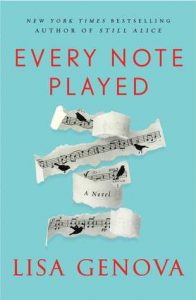 Karina’s musical talent surpasses her boyfriend Richard’s, but she sacrifices her dream to their marriage and child, and then falls in love with jazz, a genre abhorrent to Richard. He builds his career as an international classical pianist, his inflating ego one of many factors in their divorce. He attempts to hide the onset of ALS from his fans, his agent, and Karina. Due to circumstances and finances, Richard moves back in with Karina, who takes over his care with the help of home health aides. In the year that robs Richard of his body, he at last opens up emotionally to his estranged daughter, and eventually he and Karina find a kind of peace.
Karina’s musical talent surpasses her boyfriend Richard’s, but she sacrifices her dream to their marriage and child, and then falls in love with jazz, a genre abhorrent to Richard. He builds his career as an international classical pianist, his inflating ego one of many factors in their divorce. He attempts to hide the onset of ALS from his fans, his agent, and Karina. Due to circumstances and finances, Richard moves back in with Karina, who takes over his care with the help of home health aides. In the year that robs Richard of his body, he at last opens up emotionally to his estranged daughter, and eventually he and Karina find a kind of peace.
Beyond being a graphic, heart-wrenching depiction of a man succumbing to a fatal disease, this story shows how women accommodate men and lose themselves, accepting a smaller life. It’s also a homily to home health aides who make the effort to maintain the dignity of their clients. The rolling flow of the writing is interrupted only by the excessive use of analogies, whole paragraphs at times. In Author Notes, Genova offers a peek into her research and sources for an accurate representation of living with ALS. The details are so vivid, if she’d written in first person, this novel would have read like a memoir.
I was fortunate to receive a digital copy of this wonderful story from the publisher through NetGalley.
Birds of Wonder by Cynthia Robinson
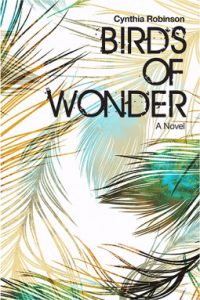 Detective Jesca Ashton has always had a challenging relationship with her mother Beatrice, which does not improve after Beatrice finds her star actress dead on the property of a local lawyer, with whom Jes had a “drive-by.” Jes has held close a secret about her father since her teens that tarnished the memories of her ornithology professor father, who had buffered her childhood from her picture perfect mother. Now she must investigate for murder someone she has known intimately through an adulterous one night stand. The case comes too close to home and Jes makes life-altering decsions.
Detective Jesca Ashton has always had a challenging relationship with her mother Beatrice, which does not improve after Beatrice finds her star actress dead on the property of a local lawyer, with whom Jes had a “drive-by.” Jes has held close a secret about her father since her teens that tarnished the memories of her ornithology professor father, who had buffered her childhood from her picture perfect mother. Now she must investigate for murder someone she has known intimately through an adulterous one night stand. The case comes too close to home and Jes makes life-altering decsions.
Robinson fully explores those implicated in the young girl’s death before their questioning by Jes and her colleagues, so they come to life as individuals and not mere suspects. The girl’s friends, twins Connor and Megan, are shown from various perspectives in all the complexities of children in foster care. Unfortunately, Connor’s story abruptly stops on his way to California—even a quick summary of his introduction to this next stage of his life would have sufficed to satisfy a reader invested in his character. Also left unexplored is the beloved father fallen, as Jes jumps to conclusions on circumstantial evidence, with hints that not all was as it seemed. Even with these minor frustrations, this story ends on a note of hope.
I was fortunate to receive a digital copy of this wonderful story through NetGalley.
Whisper Me This by Kerry Anne King—pub date August 1, 2018
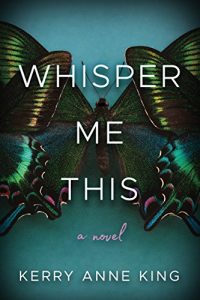 In her childhood, Marley talked Maisey into adventures for which she abandoned Maisey to take the blame. Maisey’s mother told her that Marley wasn’t real, even though she was as real as her mother to Maisey. In her third decade, raising her daughter Elle by herself, Maisey continues to be scatterbrained and unfocused, and has never been normal according to Elle, who wants her to stay that way. Elle is 12 when Maisey receives a phone call that her mother is dying, circumstantial evidence pointing to her father, a man she has always known as a gentle buffer between her mother and herself, as the cause. She must go home and untangle the ugly mess, uncovering a mystery in the process. This sets her off on an adventure to uncover her mother’s secret, revealing much about herself and their relationship in the process. The love interest has his own secrets, and Maisey is the catalyst for his family recognizing his trauma and helping him to move past it. As the EMT / firefighter responding to her family’s emergencies, he is woven into her story as an eventuality.
In her childhood, Marley talked Maisey into adventures for which she abandoned Maisey to take the blame. Maisey’s mother told her that Marley wasn’t real, even though she was as real as her mother to Maisey. In her third decade, raising her daughter Elle by herself, Maisey continues to be scatterbrained and unfocused, and has never been normal according to Elle, who wants her to stay that way. Elle is 12 when Maisey receives a phone call that her mother is dying, circumstantial evidence pointing to her father, a man she has always known as a gentle buffer between her mother and herself, as the cause. She must go home and untangle the ugly mess, uncovering a mystery in the process. This sets her off on an adventure to uncover her mother’s secret, revealing much about herself and their relationship in the process. The love interest has his own secrets, and Maisey is the catalyst for his family recognizing his trauma and helping him to move past it. As the EMT / firefighter responding to her family’s emergencies, he is woven into her story as an eventuality.
King brilliantly sets up family dynamics that clearly show the repressed fear of the mother and the compensating kindness of the father, and how secrets create chaos and confusion in relationships. There are a couple of slight distractions from the story: Maisey throws up or feels like it a LOT; Whenever the love interest appears, he’s described in Harlequin Romance hunky terms. Despite this, the story moves along at a brisk pace, with the mom’s backstory presented through her journal, an intimate medium that elicits sympathy. It’s a very human story full of complex emotions and motivations, a must-read!
I was fortunate to receive an ARC through NetGalley of this wonderful book.

